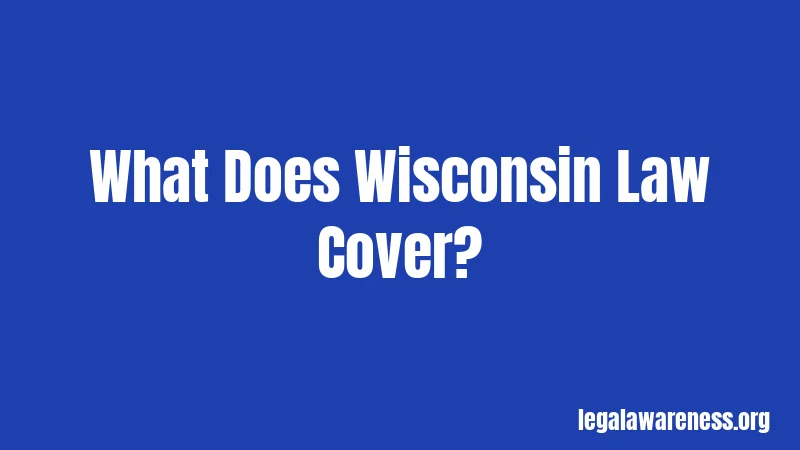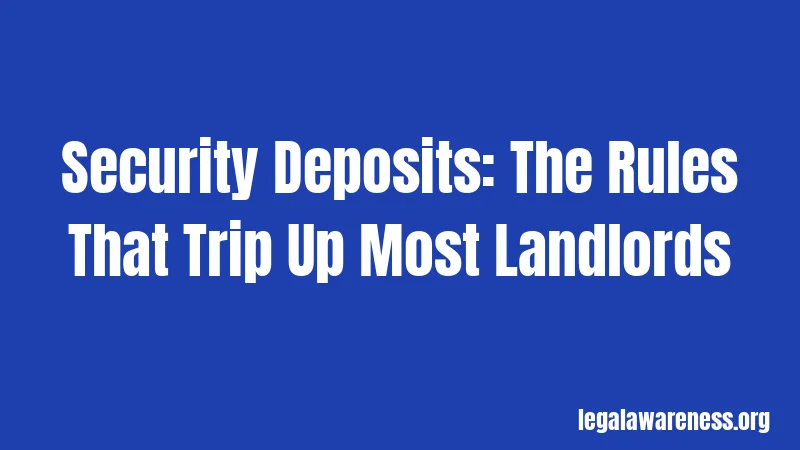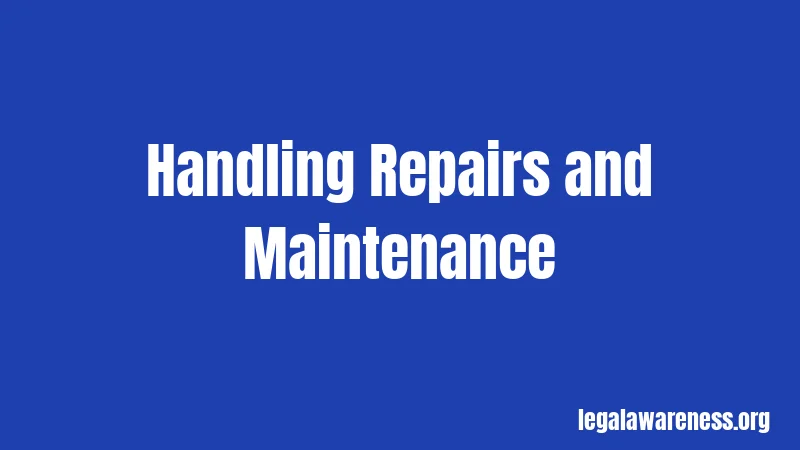Wisconsin Landlord Laws in 2026: Complete Rights & Responsibilities Guide
Most landlords in Wisconsin have no idea how strict the rules are. Seriously. You could lose thousands of dollars if you mess up the security deposit rules alone. But here’s the good news: once you understand Wisconsin’s landlord laws, managing rentals becomes pretty straightforward.
If you’re a landlord in Wisconsin—or thinking about becoming one—you need to know the rules. Getting them right protects you from lawsuits and keeps your tenants happy. Let’s break down exactly what Wisconsin law requires.
What Does Wisconsin Law Cover?

Wisconsin’s landlord-tenant laws are found in Chapter 704 of the Wisconsin Statutes. These laws spell out what landlords must do and what tenants are allowed to do.
Think of it like a traffic rulebook, but more serious. The state sets minimum rules that apply to every rental in Wisconsin. Even if your lease says something different, Wisconsin law still applies. This is important stuff.
Basic Rental Requirements in Wisconsin
Your Responsibility to Provide Safe Housing
Here’s where it gets important. You must provide housing that’s safe and fit to live in. This isn’t optional. Wisconsin law requires your rental to meet basic health and safety standards.
What does this mean? Your rental must have functioning heat, hot and cold running water, working electricity, and proper sanitation. The property must be structurally sound. No broken windows that don’t close, no holes in walls, and no pest infestations.
Tenants have a right to these basic things. Honestly, this is the part most landlords miss. When a tenant complains about a problem, you need to fix it promptly. What does “promptly” mean? Within a reasonable timeframe—typically days, not weeks.
Your Right to Rent Payment
Rent payments are pretty straightforward. Your lease sets the due date and amount. Tenants must pay on time, just like the lease says.
Now here’s something important: Wisconsin doesn’t limit how much you can charge for late fees. But the fees must be reasonable and spelled out in the lease. You can’t just make up a fine when rent is late.
Something cool about Wisconsin law—there’s no limit on rent increases either. You can raise the rent as much as you want. Just remember, for month-to-month tenants, you need to give 28 days’ notice before the increase takes effect.
Cash Payment Receipts
If a tenant pays in cash, you must give them a written receipt. This seems simple, but landlords skip this step all the time. The receipt should show the amount and date of payment.
Why does this matter? Because if there’s ever a dispute about whether rent was paid, you’ll need proof. Cash receipts protect you and the tenant.
Security Deposits: The Rules That Trip Up Most Landlords

Okay, pause. Read this carefully. More landlords get sued over security deposits than anything else.
Wisconsin security deposit laws are strict. Seriously. Get this wrong and you could owe a tenant double the deposit amount plus their attorney fees.
How Much Can You Charge?
Wisconsin has no state-wide cap on security deposits. You can charge whatever you want—technically. But here’s the reality: if you charge more than one month’s rent for an unfurnished unit (or two months’ for furnished), tenants might just pick another landlord.
The standard is one month’s rent for unfurnished units, two months’ for furnished. Stick with that and you’ll be fine.
One more thing: you can’t increase the deposit mid-lease. If the tenant signed at $1,200 rent, you later raise it to $1,300, the original deposit stays the same.
The 21-Day Rule (Do Not Skip This)
You have exactly 21 days after a tenant moves out to return the security deposit. Not 22 days. Not “sometime this month.” Twenty-one days.
Miss this deadline and you forfeit your right to keep any of the deposit. The whole amount goes back. It’s the law.
But it gets worse. If the tenant sends a written demand and you still don’t pay within seven days, they can sue you for double the amount plus attorney fees and court costs. That’s serious money.
I’ve seen landlords lose thousands simply because they missed the 21-day deadline. They could’ve easily avoided it by setting a calendar reminder.
What Can You Deduct?
You can deduct from the security deposit for unpaid rent, repairs for damage beyond normal wear and tear, unpaid utilities, and other legitimate costs.
Normal wear and tear is anything that happens with regular use. Scuffed walls? That’s normal wear. Worn carpet from walking on it? Normal wear. You can’t charge for those.
Holes in walls from nails? That’s damage. Broken appliances? Damage. Those come out of the deposit.
The key word: reasonable. Your deductions must be for actual costs you paid, not guesses. If carpet cleaning costs $300, you can deduct $300. You can’t charge $500 just because you feel like it.
You Must List Every Deduction in Writing
When you return the deposit, include an itemized statement. This lists each deduction and why you made it.
Sound complicated? It’s actually not. Just write down each item, the cost, and explain what happened. Send it with the deposit refund. This protects you because it shows the tenant exactly why money was withheld.
Interest on Deposits
Wisconsin law doesn’t require landlords to pay interest on security deposits. Most landlords charge nothing. If a local municipality has interest rules, they’re grandfathered in only if they existed before the state law changed.
Bottom line: no interest required. Check your local rules just to be safe.
Landlord Entry Rights in Wisconsin
Your tenants have the right to privacy. But you have the right to access your property when needed.
Here’s the rule: you must give 12 hours’ written notice before entering. The notice must be in writing and delivered to the tenant. Exceptions only apply in emergencies like fires or gas leaks.
You can enter for repairs, inspections, showings to prospective tenants, or other legitimate reasons. But you must follow the 12-hour notice rule.
Not sure what counts? That’s the question everyone asks. You can enter to fix a broken heater, paint a wall, or show the apartment to potential tenants. You cannot enter just to check up on the tenant or snoop around.
Wondering about tenant lock changes? Tenants can’t change the locks without permission. Exception: recent domestic violence victims can require a lock change at their own expense.
Handling Repairs and Maintenance

Tenants have a right to repairs. Here’s what the law expects from you.
When a tenant notifies you of a needed repair in writing, you must fix it promptly. “Promptly” typically means within days or maybe a week, depending on the repair’s urgency.
A broken heater in winter? That’s urgent. Needs repair immediately. A loose cabinet handle? Less urgent, but still needs fixing within a reasonable timeframe.
If you don’t make repairs in time, tenants can withhold a portion of their rent. This is called “repair and deduct.” They essentially pay for the repair themselves and subtract it from rent. Only Wisconsin tenants can do this—most states don’t allow it.
To protect yourself, respond quickly to repair requests. Document everything. Keep a log of when repairs were requested and when completed.
Fair Housing Laws Apply to You
Wisconsin follows the federal Fair Housing Act. This means you can’t discriminate based on race, color, religion, national origin, sex, disability, familial status, sexual orientation, or marital status.
What does this mean in practice? You can’t refuse to rent to someone because they have kids. You can’t charge higher rent because of someone’s religion. You can’t require different deposit amounts based on someone’s disability.
You can set your own tenant screening criteria. You can require good credit or income verification. But these must apply equally to everyone. Don’t apply stricter rules to certain groups.
Evictions: Following the Correct Process Is Critical
Evictions in Wisconsin aren’t quick. They take time and require court approval. You can’t just remove a tenant yourself.
The biggest mistake landlords make? Trying to force a tenant out without going to court. Changing locks, removing belongings, shutting off utilities—all illegal. You can face serious consequences if you try this.
Eviction Grounds
You need a valid reason to evict. Wisconsin recognizes these grounds:
Non-payment of rent: The tenant is late on rent and doesn’t pay after notice.
Lease violations: The tenant broke lease terms. Examples: unauthorized occupants, pets in a no-pet unit, property damage, or other violations.
Property damage: The tenant caused serious damage to the rental.
End of lease term: The lease expired and the tenant won’t leave. For month-to-month tenants, you need a 28-day notice.
Criminal activity: The tenant is using the unit for gang activity, drug dealing, or similar illegal purposes.
The Notice Requirements
Different violations require different notices. This is where landlords get confused.
5-Day Notice to Pay or Quit: For non-payment of rent on leases one year or less. Tenant has five days to pay or move out.
14-Day Notice to Quit: Use this if the tenant had a prior violation within the past year and commits the same violation again.
30-Day Notice to Comply: For long-term leases (over one year) with lease violations. Gives the tenant a chance to fix the problem.
28-Day Notice to Terminate: For ending a month-to-month tenancy without cause. Tenant has 28 days to move out.
5-Day Notice for Criminal Activity: If police report gang or drug activity, you can give a 5-day notice with no cure opportunity.
Confused about which notice to use? Check your lease length and the reason for eviction. The Wisconsin Court System website has templates.
The Eviction Process: Step by Step
Hold on, this part is important. The process has specific steps.
Step 1: Serve proper notice – Deliver the correct notice to the tenant using legal service methods.
Step 2: Wait the required time – For a 5-day notice, wait five full calendar days. For a 14-day notice, wait 14 days.
Step 3: File in court – After the waiting period expires and the tenant hasn’t complied, file your eviction case in small claims court or circuit court.
Step 4: Serve court papers – The court summons must be served to the tenant by a process server or law enforcement.
Step 5: Attend court hearing – Present your evidence to the judge. Bring your lease, proof of notice, rent records, photos of damage, whatever supports your case.
Step 6: Obtain court order – If you win, the judge issues an order for eviction.
Step 7: Sheriff removal – After the order, the county sheriff enforces it and removes the tenant (if they don’t leave voluntarily).
The timeline? Usually two to four months from start to finish. It takes time.
Serving Notice Properly Is Critical
You’ve probably heard “improper service” causes landlords to lose evictions. This is absolutely true.
Notice must be properly served to the tenant. Methods include personal delivery, certified mail, or posting on the property (in some cases). Document how you served the notice. Keep the receipt.
Serving notice wrong? You lose the eviction. You have to start over. Seriously, get this right.
You Cannot Remove a Tenant Yourself
Let me be crystal clear: you cannot use self-help eviction. Changing locks, removing belongings, shutting off utilities—all illegal in Wisconsin.
If you do this, the tenant can sue you. You could face damages and attorney fees. You could go to jail. This happens. Don’t do it.
Only the court and sheriff can remove a tenant. Follow the legal process.
Your Tenant Screening Rights
You can screen potential tenants. Wisconsin allows landlords to run background and credit checks. You can charge a $25 fee for credit checks or $25 for background checks. These are non-refundable.
Prospective tenants can waive the fee by providing their own credit report (no more than 30 days old).
You can set reasonable requirements. Good payment history, sufficient income, acceptable references. These must apply equally to all applicants.
What you can’t do: discriminate based on protected classes. You can’t have higher credit score requirements for certain groups. You can’t require income standards that target specific protected classes.
Rent Increases and Notice Requirements
Wisconsin has no statewide rent control. You can raise rent as much as you want. That’s landlord-friendly.
But you must follow notice requirements. For month-to-month tenants, give 28 days’ written notice before the increase takes effect.
For fixed-term leases, you can only increase rent when the lease renews. You can’t raise rent mid-lease.
If rent is payable more frequently than monthly (weekly rent), notice must equal at least the rental period. Makes sense, right?
Lease Agreements and Written Leases
Writing things down matters. A written lease clarifies expectations and protects both parties.
For leases longer than one year, Wisconsin requires a written lease. Shorter leases can be oral, but written is always better.
Your lease should include rent amount, due date, lease term, and property description. You can add nonstandard provisions for deposit deductions. These must be in a separate document labeled “NONSTANDARD RENTAL PROVISIONS.”
The tenant must initial each nonstandard provision. If they don’t sign, that provision isn’t enforceable.
Domestic Violence Protections
Wisconsin law protects tenants experiencing domestic violence. These tenants can request lock changes at their own expense.
They can also terminate their lease early if fleeing an abuser. Providing notice and proof (court order, protective order, police report, etc.) allows them to break the lease without penalty.
As a landlord, you must comply with these requests. Refusing could expose you to discrimination claims.
Penalties for Breaking Wisconsin Landlord Laws
Get these rules wrong and penalties can be severe. Here’s what you risk:
Security deposit violations: You could owe double the withheld amount plus attorney fees.
Fair housing violations: Civil lawsuits, administrative complaints, and damages. The damages can be substantial.
Illegal eviction: Tenants can sue for unlawful removal. Damages include compensatory damages plus punitive damages.
Retaliation violations: You can’t punish tenants for asserting their rights. Violating this can result in damages.
Habitability failures: Tenants can withhold rent, make repairs, or break the lease without penalty.
These aren’t small fines. These are courtroom battles that cost thousands.
What to Do Now: Protecting Yourself
Document everything. Keep records of rent payments, repair requests, notices served, and tenant communications.
Take photos of the property condition before and after tenant occupancy. This protects you in deposit disputes.
Use written leases. Make sure they comply with Wisconsin law. Download templates from the Wisconsin Court System if needed.
Respond promptly to repair requests. Keeping tenants happy prevents disputes.
Screen tenants carefully using consistent, non-discriminatory criteria. This reduces problems down the road.
Get legal help if you’re facing an eviction. Wisconsin eviction law is technical. One mistake can cost you the case. An attorney specializing in landlord-tenant law is worth the investment.
Frequently Asked Questions
Can I keep the security deposit if the tenant breaks the lease early? No. The security deposit can only be used for specific deductions like unpaid rent, damage, or cleaning. Breaking the lease isn’t a deduction unless the tenant owes you money. You’d need to pursue damages separately.
What happens if a tenant doesn’t pay utilities included in the lease? You can deduct unpaid utility costs from the security deposit if the lease makes you responsible for paying them and the tenant defaults.
Can I require references from previous landlords? Yes. References are a legitimate screening tool. Apply this requirement equally to all applicants.
How long can the eviction process take? Typically two to four months, depending on court schedules and whether the tenant contests the case. Self-help eviction won’t speed it up—it just creates legal problems for you.
What should I do if a tenant stops paying rent? Serve a 5-day notice to pay or quit immediately. Document everything. If they don’t pay within five days, file for eviction in small claims court. Don’t wait.
Final Thoughts
Wisconsin landlord law is detailed, but not impossible to understand. The key rules: provide safe housing, handle security deposits correctly, give proper notice, and follow the legal eviction process.
Landlords and tenants both benefit when the rules are followed. You protect your property rights, avoid lawsuits, and build better landlord-tenant relationships. Tenants get safe housing and know their rights are respected.
Stay informed, document everything, and when in doubt, consult a Wisconsin attorney familiar with rental law. Now you know the basics. Stay compliant, stay safe, and keep your rental business running smoothly.
References
Wisconsin State Statutes
- Wisconsin Chapter 704 – Landlord and Tenant Relations
- Wisconsin Chapter 799 – Eviction Procedures
- Wisconsin Administrative Code Chapter ATCP 134 – Residential Rental Practices
Official Government Resources
- Wisconsin Department of Agriculture, Trade, and Consumer Protection – Landlord-Tenant Guide
- Wisconsin Courts – Eviction Information
- Wisconsin State Bar – Landlord-Tenant Information
Tenant Resource Information
Additional Resources
